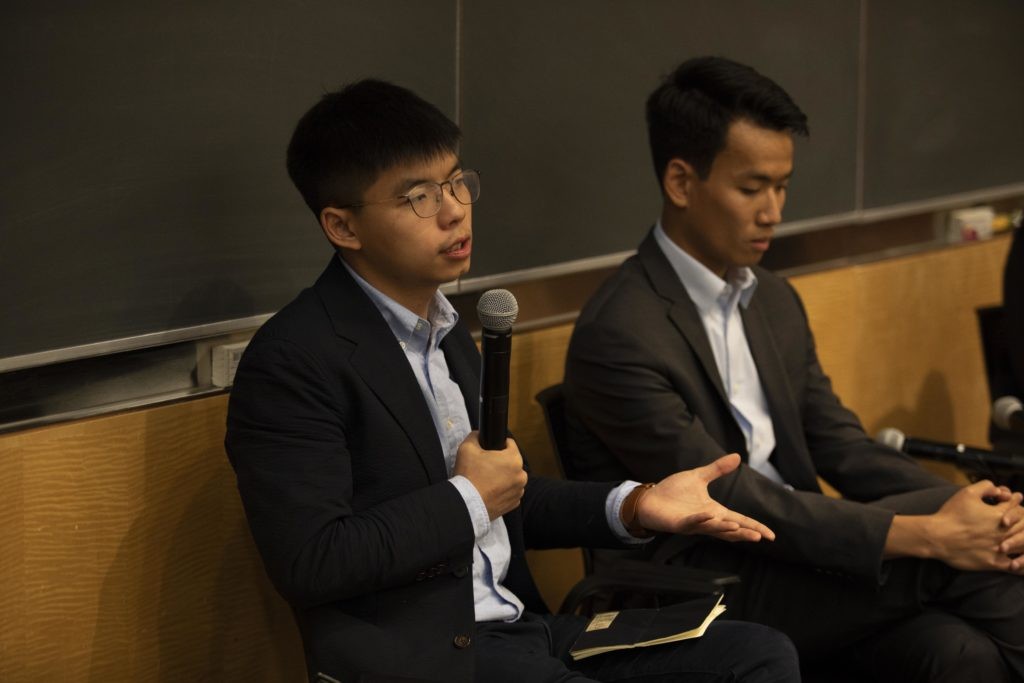Hong Kong Pro-Democracy Activists Joshua Wong and Brian Leung Hold Dialogue with Students
Joshua Wong and Kai Ping (Brian) Leung, two vocal activists in Hong Kong’s anti-extradition bill protests, visited Columbia on September 13 to speak with students about demonstrators’ aims and the significance of the leaderless movement.
The event, held at the Columbia Law School and organized by the Weatherhead East Asian Institute (WEAI) with the Center for Chinese Legal Studies, was at full capacity, with approximately 200 students, faculty, and members of the media in attendance.
Wong and Leung’s appearance at Columbia marks their first public event in the US since the mass protests became a fully-fledged movement in June. The first wave of protests began in the spring in opposition to a bill proposed by Hong Kong Chief Executive Carrie Lam and backed by Beijing leadership that would allow extraditions from Hong Kong to mainland China.
“We hope the words of Hong Kong people could be heard not only in Hong Kong but also in the international community,” Wong told the audience at Columbia.
Wong praised the “faceless” anti-extradition movement, in contrast with the smaller-scale “Umbrella Movement” of 2014—which launched him into the spotlight at the age of 15 as the face of the pro-democracy student protests.
“Now is not the time to put a global spotlight on Brian or I, now is the time to put the global spotlight on Hong Kong’s strike,” Wong said. “I just hope through sharing [our experiences] we collect more people impressed by the strike in Hong Kong, [and that] our movement would go forward until the day with democracy.”
In his remarks, Leung added praise for the current protesters. “The reason why I’m able to speak here is because there are many more unsung heroes, young people throwing their bodies literally at the regime, making sacrifices, making the movement possible.” Leung cited tear gas and rubber bullets used by the riot police. The reason the movement has been able to continue for as long as it has is because, with no one figure leading the charge, “people have retained ownership of the movement.”
In response to a question about Chinese media reports asserting that the goal of the anti-extradition movement is Hong Kong’s independence, Wong reiterated that the demonstrators continue to fight for five clear demands—including the withdrawal of the bill and the resignation of Chief Executive Lam—which do not conflict with the “one country two systems” policy.
Columbia Professor Benjamin Liebman and WEAI Research Scholar Michael Davis moderated the event. In his opening remarks, Professor Liebman spoke of the value of freedom of speech and of Columbia’s strength in creating an environment conducive to a productive exchange of opinions. “We here at Columbia are uniquely positioned to foster conversations on difficult topics through respectful conversations,” he said.
During the Q&A, Wong and Leung faced critical questions about their rationale and tactics and those of their fellow protesters, including the use of violence and the presence of minors in the frontlines of the protests. Despite various disagreements between the speakers and members of the audience, the tone of the discussion remained civil throughout the event. A group of protesters opposed to Wong and Leung’s visit staged a peaceful protest in front of campus.
A video of the event is available here.

